In this roundup of the Court Judgements, we look at the Supreme Court’s directions to the Odisha government to implement the comprehensive wildlife management plan, the Allahabad High Court’s observations on the service conditions prescriptions, the Karnataka High Court’s observations on section 28 of the Pre-conception and Pre-natal Diagnostic Techniques (Prohibition of Sex Selection) Act, 1994 and the Kerala High Court’s observations regarding the scope of Consumer Protection Act, 2019 and telecast banning of Media One.
SC: Implement Comprehensive Wildlife Management Plan before permitting any mining activity in Eco-Sensitive Zone
In Binay Kumar Dalei vs. State of Odisha, the Supreme Court bench of Justice L. Nageshwar Rao and Justice B.R. Gavai directed the Odisha Government to undertake the implementation of a comprehensive wildlife management plan as suggested by the National Board for wildlife before permitting any mining activity in eco-sensitive areas.
The apex court was hearing an appeal against the order of the National Green Tribunal (NGT) which refused to permit mining activity within and in the areas around the Simlipal- Hadagarh- Kuldiha – Simlipal elephant corridor. The tribunal also ordered the state to complete the process of declaration of conservation reserve as per Section 36 of the Wildlife (Protection) Act, 1972 within three months.
The area comprising portions of Mayurbhanj, Balasore, Bhadrak and Keonjhar was declared as Elephant Reserve under ‘Project Elephant’ by the Government of Odisha. The court then looked at the Notification of the Ministry of Environment and Forests, Government of India, regarding the permission for conducting non-forestry activities in wildlife habitats. In the notification, it was mentioned that environmental clearances for any project that falls within the 10 km boundary of the National Parks and Sanctuaries will be subject to the recommendations of the Standing Committee of the National Board for Wildlife.
The 40th meeting of the Standing committee approved the plan to operate certain stone quarries subject to the implementation of a comprehensive wildlife management plan. In another latest notification issued by the Ministry of Environment, Forest, and Climate Change (MoEFCC), it had notified the area with an extent varying from zero (along with urban areas/NAC areas adjoining the boundary on the Eastern side), 500 metres on South-Eastern side, 7 km on Western Side up to Keonjhar District to 2 km around Kuldiha Wildlife Sanctuary in the State of Odisha as Kuldiha Wildlife Sanctuary eco-sensitive zone. And any activity in this zone is covered by the act.
Accordingly, the stone quarry owners started operations after obtaining permission from the District Environmental Impact Assessment Authority. However, the NGT directed that no mining shall take place even though the quarries lie outside the vicinity of the eco-sensitive zone. The appellant and the state government felt that this is not justifiable, while the respondent argued that unless the comprehensive wildlife management plan and section 36A of the Wildlife (Protection) Act, 1972 have fully complied with, no mining activity can take place.
Considering the above arguments, the court felt that an amicable solution to close this dispute is to comply and implement the comprehensive wildlife management plan and expedite the process of declaration of elephant corridor as conservation reserve under section 36A of the Wildlife (Protection) Act, 1972. Unless these are achieved, no mining activity shall take place.
Allahabad High Court: Courts can’t direct Govt to have a particular method of recruitment, eligibility criteria for services.
During the hearing of a writ petition, Alok Shukla & another vs. State of Uttar Pradesh and 2 Others, the Allahabad High Court remarked that the prescriptions and service conditions are the exclusive domain of the State and that it is not open for courts to direct the government to follow any particular method of recruitment and eligibility criteria.
The court was hearing a writ petition filed by the petitioner against the recruitment advertisement of UPPSC for 16 posts of Mining officer and a requisition for 36 posts of Mining Inspector that has been forwarded by the State Government for selection and appointment. As per the Uttar Pradesh Geology and Mining Service Rules, 1983, the qualifications for mining inspector are diploma in mining engineering and for the post of mining officer, it is either the diploma in mining engineering with one year experience or degree in mining engineering. The applicants possessed a Postgraduate degree in Geology, which is higher than the requirement specified.
The bench headed by Justice Manju Rani Chauhan acknowledged that the petitioners had the higher qualifications, but it also reminded that the state government did not issue any notification providing for equivalence of any other qualifications to these posts. The bench also remarked that it is the state government that must provide policy decisions regarding changing qualifications and the court cannot judicially review such policy decisions unless they are grossly arbitrary or irrational.
The court relied on judgements in Chandigarh Administration vs. Usha KheterpalWaie and others, (2011) where the Supreme Court held that
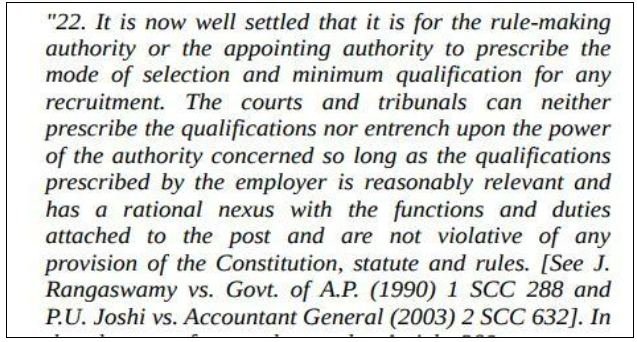
In Vasavi Engineering College Parents Association vs. State of Telangana & Ors, the apex court held that ‘Court can neither act an appellate authority nor can usurp the jurisdiction of decision-maker and make the decision itself. ‘It also remarked that:
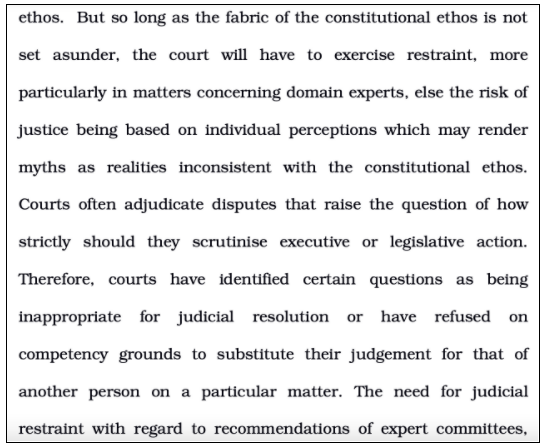
Accordingly, the court concluded that the above matter is a policy decision, and the policy decisions of the State are not to be disturbed/interfered with unless they are found to be grossly arbitrary or irrational. It also suggested the petitioners file a representation with the appropriate authority, who shall decide on such representation preferably within two months of such representation.
Karnataka High Court: Prenatal Sex Determination – Magistrate can’t take cognizance of a complaint unless filed by ‘Appropriate Authority’ notified by Government
During the hearing of the criminal petition in Dhondiba Anna Jadhav vs. The State of Karnataka, the high court held that the magistrate cannot take cognizance of a complaint filed under Section 28 of the Pre-conception and Pre-Natal Determination Test Act, 1994 (PCPNDT Act, 1994) unless it is filed by the Appropriate authority.
The bench headed by Justice Nagaprasanna was hearing a petition for quashing criminal proceedings against Dhondiba Anna Jadav and others who run Sri Dhondiba Anna Jadhav Memorial Hospital, based on a complaint given by the Taluk Health Officer (respondent). The primary allegations were that the hospital did not maintain records and it also has equipment installed that can determine the sex of the fetus. This is in contravention to the PCPNDT Act, 1994.
The petitioners argued that the respondent is not the appropriate authority under section 28 of the PCPNDT Act, 1994 to either inspect or complain of the violation. The counsel for the government argued that the state government had issued a notification on 15 October 2011, appointing the Assistant Commissioner as the appropriate authority under Section 17(2) of the PCPNDT Act, 1994 and the appointed authority is well authorized to initiate action under section 17A of the PCPNDT Act, 1994.

The government, therefore argued that on the joint reading of the notification as well as section 17(2) of the act, the Assistant Commissioner is the appropriate authority. However, section 28 of the same act mentions that,
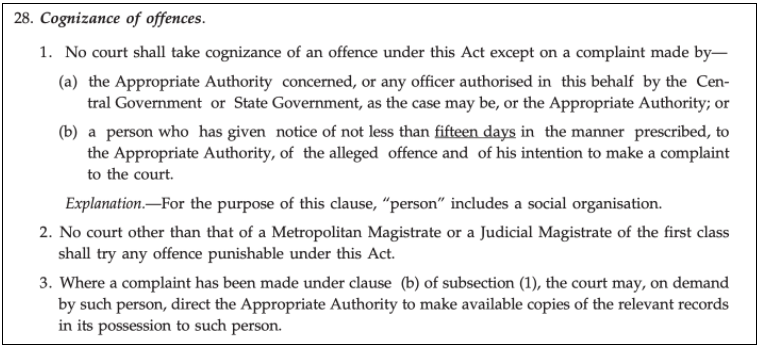
Therefore, the Taluk Health Officer is not the appropriate authority for taking cognizance of the offences under section 28 of the PCPNDT Act, 1994. Considering all the actions taken without jurisdiction, the court concluded that the petition deserved to succeed, failing which could result in a miscarriage of justice.
Kerala High Court: Medical Services’ fall within ambit of Consumer Protection Act, 2019
During the hearing of a petition in Dr Vijil & Ors vs. Ambujakshi T.P & Anr., the bench headed by Justice N. Nagaresh held that medical services will come under the purview of section 2(42) of the consumer protection act, 2019.
The bench was hearing a petition filed by a group of doctors to declare that complaints under medical negligence and deficiency of services do not come under the jurisdiction of the consumer fora under the Consumer Protection Act, 2019 and to quash the orders of district and state consumer dispute redressal commissions. The respondent lost eyesight after consultation with the petitioners and sought compensation of Rs. 32,50,000 on account of medical negligence.
The counsel for petitioners argued that the draft consumer protection bill included the health sector under section 2(42) but was removed in the enacted bill. The counsel also argued that in Indian Medical Association v. V.P. Shantha and others, the apex court held that medical service/profession comes under the purview of section 2(1)(o) of the Act, 1986. The new law, despite medical service/profession being declared to be included in ‘service’ under section 2(1)(o) of the Act, 1986 removed it from the newly enacted section 2(42) of the Act, 2019. This shows the intention of the Parliament not to include medical service/profession under the ambit of the new consumer protection act, 2019. Also, the lack of experts except at the National Commission level in consumer protection courts adds weight to this argument.
The Hon’ble Justice N. Nagaresh observed that both section 2(1)(o) of the old consumer protection act, 1986 and section 2(42) of the newly enacted consumer protection act, 2019 have the same meanings and implications. It is just that the newly enacted section is more descriptive. This definition is inclusive but not exhaustive. The words ‘but not limited to’ in section 2(42) clarify the inclusive intention of the parliament.
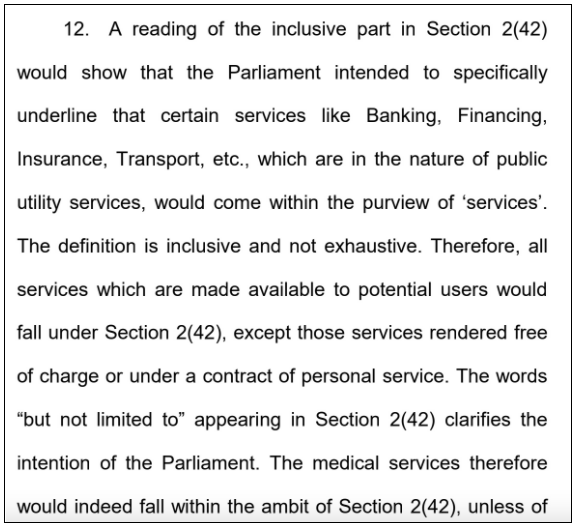
Also, the argument that the draft bill did include the health sector, but the enacted bill did not include, does not hold ground as it is unsustainable in the view of well-settled principles of interpretation of statutes. And since the apex court already interpreted that medical service/profession comes under a similar section of the 1986 act, the same logic applies here as the provisions are nearly identical, though both acts of 1986 and 2019 does not specifically include ‘medical service’. Accordingly, the case was dismissed and ruled in favour of the respondents.
Kerala HC: Clear, significant indications impacting public order & security – Kerala High Court while upholding Telecast Ban on Media One.
During the hearing of an appeal against the single judge order which upheld the order passed the Ministry of Information and Broadcasting not to renew the license granted to Media One news channel to broadcast, the division bench in Madhyamam Broadcasting Limited vs. Union of India upheld the single bench order.
The division bench headed by Chief Justice S. Manikumar and Justice Shaji P. Chaly remarked that there are serious reports by the intelligence bureau against Madhyamam Broadcasting Limited and its Managing Director. Though the court held that there are clear and significant implications, the gravity and depth of such an issue is not deducible from the confidential files.

The Media One’s permission for uplinking and downlinking was due to end on 29 September 2021. The company applied for renewal on 03 May 2021. Though the application for renewal of license was submitted earlier, the Ministry of Home Affairs informed the company that the security clearances were not issued in the past and it is the same for the present too. And since the security clearances are denied, the eligibility was ceased. A show-cause notice was served as to why the permission should not be revoked or cancelled.
The petitioners argued that the issue of security clearances not issued is not correct and the show cause notice sent to them was vague. They filed a writ petition and the single judge, in that case, observed that the information and broadcasting sector is a sensitive one and,
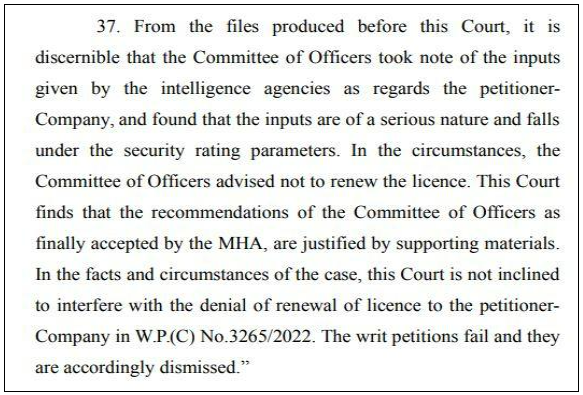
When the petitioner claimed that they were never granted an opportunity to be heard while denying the security clearance, the court relied upon Ex-Armymen’s Protection Services P. Ltd. vs. Union of India and others and Digi Cable Network (India) Pvt. Ltd. vs. Union of India and others and held that observance of strict principles of natural justice cannot be insisted by the parties and the courts must read for and provide statutory exclusion. And since the intelligence inputs are secretive in nature, the reason for non-disclosure is in the interest of national security.
The court observed that in normal situations, the government cannot interfere with the freedom enjoyed by the press as was held by the apex court. It also observed that there are certain files that show that there is a danger to public order or the security of the state based on the files produced.
The court remarked that:
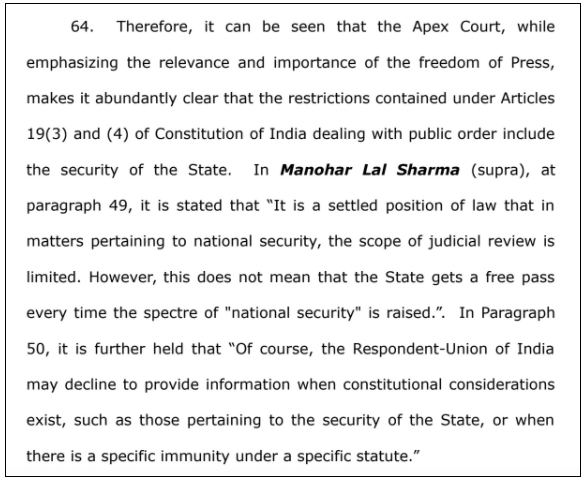
The court pointed out the inability of the petitioners to establish a jurisdictional error or other legal affirmatives in the order of the single judge bench. Accordingly, considering all the files produced before the bench, the division bench agreed with the order of the single judge bench declining interference with the order of the Ministry of Information and Broadcasting refusing the permission to uplink and downlink to M/S. Madhyamam Broadcasting Limited for telecasting operations.
Featured Image: Important Court Judgements


